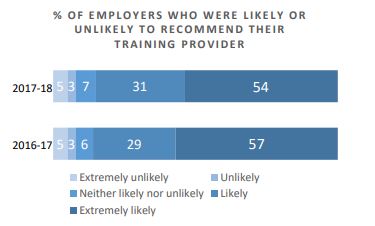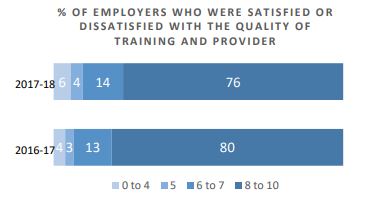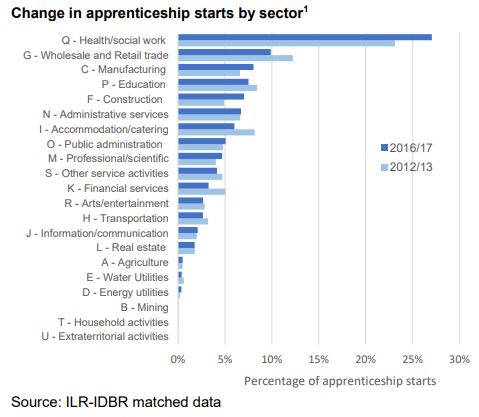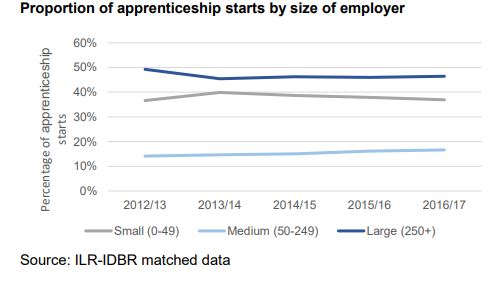It has been a mixed week for independent learning providers, after four were found lacking in Ofsted inspections – one of which fell from ‘outstanding’ to ‘requires improvement’.
However, it was more positive news for four other ITPs and a general FE college, which were found to be making good headway in their own monitoring visits.
Rotherham-based Develop-U’s early monitoring visit of its new apprenticeship provision was found to be poor in every category during a worrying visit from inspectors on September 19.
The provider, which has been a subcontractor and on a commercial basis since 2005, is currently training 51 levy-funded apprentices.
Inspectors said recruitment is left to employers, meaning that leaders and managers “are unsure about the suitability of apprentices on some programmes, including a minority of apprentices who behave in ways that are unprofessional and inappropriate”.
“Disruptive behaviour impedes the progress and prospects of these apprentices,” inspectors warned. “Managers blame the apprentices for this slow progress; however, apprentices are not sufficiently motivated and engaged by the teaching they receive.”
The report said apprentices “do not benefit from accurate information, advice and guidance”, and “repeatedly” fail English and maths examinations.
Safeguarding was also a concern at the provider, and the report said that, during the visit “inspectors became aware of an at-risk apprentice about whom leaders were not aware”.
So far, all apprenticeship providers found to be making ‘insufficient progress’ in at least one area up until the end of September have been barred from taking on new starts until their next full inspection. The Education and Skills Funding Agency will now have to decide whether to also ban Develop-U.
It was a fall from grace for the Summerhouse Equestrian and Training Centre, which received its grade three rating after an inspection on September 18. The Gloucestershire-based provider had been rated ‘outstanding’ at its last inspection in September 2009.
This time inspectors warned that leaders had struggled to manage the growth of the company, monitor the quality of teaching or understand the strengths and weaknesses of their subcontractors’ provision, and said both quality and outcomes had “declined”.
The report said “too many” apprentices with subcontractors either do not achieve their qualifications or take too long to do so, and “not enough of teaching is of a good enough standard”.
However, Summerhouse received ‘good’ ratings for its adult learning programmes and the personal development, behaviour and welfare of learners, and Ofsted said the provider managed its own apprenticeships well and provided effective career guidance.
Derbyshire’s Lifelong Opportunities was also given a grade three rating after an inspection on September 18. The learning provider was purchased by two directors in January this year, and inspectors found that “directors have taken sensible actions to bring about improvement, but these actions have not year had the desired impact”.
Tower College of Further and Higher Education London, based in Lewisham, was found to be making ‘insufficient progress’ in a monitoring visit carried out after it was rated ‘requires improvement’ in February.
The report said leaders had “not been successful enough in bringing about improvements” or critical enough to understand what they need to do to improve. There are no plans to standardise the quality of lesson observations, and tutors do not ensure that all learners are making good progress.
There was better news in monitoring visits for other training providers, including London’s Recalvi Enterprise and VQ Solutions which were both found to be making ‘significant progress’ in two categories they were assessed on.
Recalvi’s leaders and managers have “made excellent use of the knowledge and skills they acquired during their time as highly effective subcontractors” to create a “successful” apprenticeship programme providing “good-quality teaching and learning”.
VQ Solutions, which was monitored after being deemed ‘requires improvement’ after an inspection in December 2017, has made “significant progress” after investing in a management information system to keep up-to-date with the progress of apprentices and ensuring apprentices understand the risks of radicalisation and extremism.
Warrington and Vale Royal College, Qualitrain and the NVQ Training Centre received ‘reasonable progress’ assessments in monitoring visits.
| GFE Colleges | Inspected | Published | Grade |
| Warrington and Vale Royal College | 02/10/2018 | 21/10/2018 |
M |
| Independent Learning Providers | Inspected | Published | Grade | Previous grade |
| Tower College of Further and Higher Eduation London Limited | 03/10/2018 | 24/10/2018 | M | |
| Lifelong Opportunities Ltd | 18/09/2018 | 21/10/2018 | 3 | N/A |
| The Recalvi Enterprise Ltd | 19/09/2018 | 21/10/2018 | M | |
| Qualitrain Limited | 26/09/2018 | 24/10/2018 | M | |
| The NVQ Training Centre Limited | 03/10/2018 | 26/10/2018 | M | |
| Summerhouse Equestrian and Training Centre LLP | 18/09/2018 | 21/10/2018 | 3 | 1 |
| Develop-U | 19/09/2018 | 24/10/2018 | M | |
| VQ Solutions Ltd | 27/09/2018 | 24/10/2018 | M |




